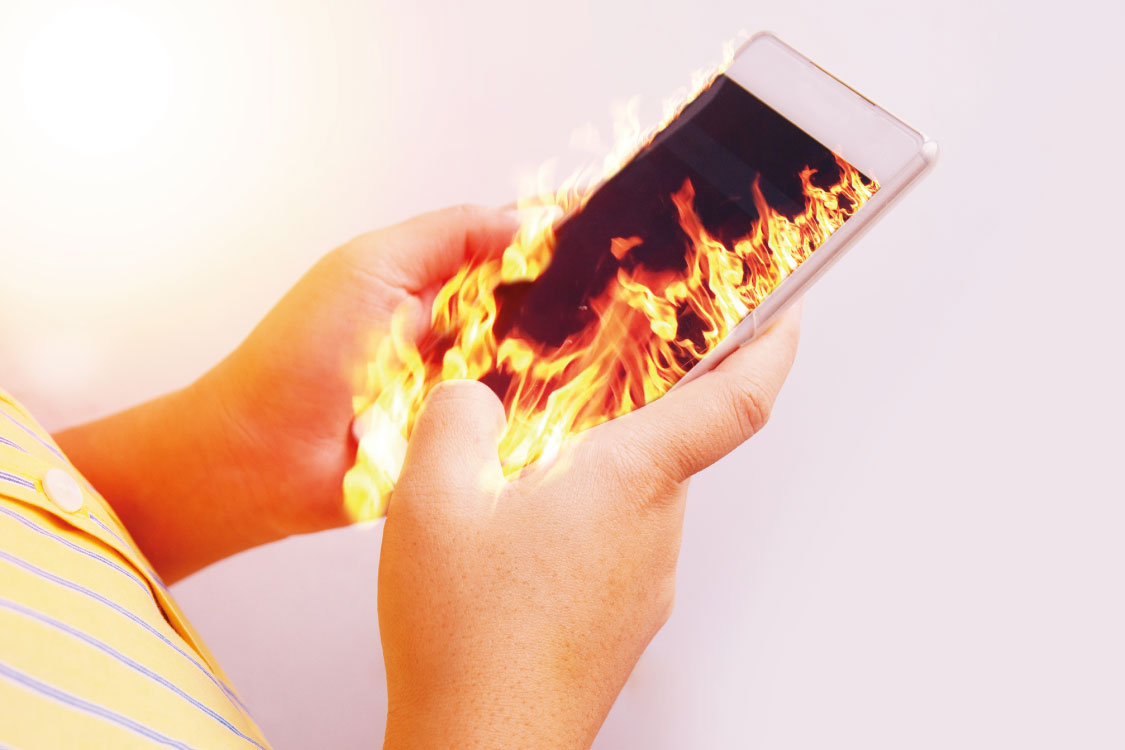Why do Lithium Ion Batteries Catch Fire and Explode?
These days, lithium-ion batteries can be found in a whole host of household electronics including laptops, mobile phones and tablets. As well as this, they’re a popular choice for large-scale energy storage systems such as electric cars and power grids across the country.
Lithium-ion batteries, particularly lithium-ion ones, are popular in these products and systems due to their proficiency to recharge. Unlike your standard alkaline batteries, lithium-ion batteries can be used over and over again, which is why they can be found in many home electronics.
The good news is that fires and accidents triggered by lithium-ion batteries are extremely rare. However, that does not mean you shouldn’t take precautions to avoid a catastrophe.
While instances may be infrequent, spontaneous combustion of lithium batteries does occur, and in this article, we’ll explain why they can catch fire and how to prevent it from happening.

How Do Batteries Work?
Before asking the question why do batteries catch fire, it’s important to have an understanding of how they work.
Time for a quick science lesson. All lithium-ion batteries have two electrodes that are kept apart by an electrolyte. An electrolyte is a substance that creates a solution that conducts electricity. An electric charge is passed through the electrolyte from a lithium-ion metal cathode, and this is what makes the battery, and therefore your electronics, operate.
However, it also creates the perfect environment for a fire to thrive. Lithium-ion batteries are built in such a way that the three core conditions of a fire (oxygen, fuel and heat) can be met.
The ingredients used in the electrolyte are known as organic solvents and they can act as fuel for a fire. This, combined with the heat generated in a battery and the oxygen that is contained in the cathode, makes for an ideal trigger for a fire.
Why Do Batteries Catch Fire?
Now we’ve established that, under the right conditions, lithium-ion batteries can provide a good environment for a fire, let’s take a look at why they occur.
Because they need to fit into a compact space, key components of a battery are extremely small and lightweight. Many of these components come in the form of thin partitions that are quite fragile, and if they become punctured or pierced a spark may occur and start a fire. As the heat of the fire increases, a process called thermal runaway can begin.
This is where the heat generated inside the battery begins to exceed the amount that is dispersed elsewhere, potentially resulting in an explosion from the battery.
It’s important to mention at this point that this is an extremely rare occurrence, but it is something you should be aware of.
How to Minimise the Risk
If your business or organisation handles a large number of products that include lithium-ion batteries, it’s important to understand the risks and how to prevent a fire from breaking out.
There are a variety of ways you can do this. Firstly, it’s good practice to ensure that the place you’re storing the batteries is not exposed to high temperatures. For example, do not leave them in a room that is known to get hot, keep them out of hot vehicles and for individual products such as laptops and mobile phones, try not to cover them with blankets or keep them in warm pockets for a significant amount of time.
Another good tip is keeping products that contain these batteries away from each other. For example, try not to keep laptops, phones and tablets all in the same bag while travelling. Sometimes this may be unavoidable, like when you visit an airport and need to keep electronics together, but on the whole, it’s a good idea. While it won’t necessarily stop a fire from occurring, keeping your items separate will mean that they won’t all be at risk.
Finally, look after your battery. Sometimes we take recharging for granted and it can actually be causing damage to your battery and making it more susceptible to faults. For instance, don’t wait until your device is completely drained to charge it and avoid overcharging. Overcharging is when you keep your device plugged in even after it has been fully charged; at this point, it usually becomes hot to touch so remember to unplug when it’s done.
At Scutum London, we’re experts in all aspects of fire safety and provide a wide range of services to keep people and property protected. From the supply, installation and maintenance of products such as fire extinguishers, fire alarm systems and doors to fire risk assessments and training for staff, we’re on hand to keep commercial, industrial and non-residential properties safe. To learn more about what we do or for some help and advice, contact us today.
Request a Callback
Just fill in your details below and we'll get back to you as soon as we can!

About Scutum London
Scutum London is a leading expert in fire safety and security solutions for businesses and organisations located across South East England, including London and Surrey.
From fire alarms, fire extinguishers and fire risk assessments to access control, CCTV and intruder alarm systems – and a lot more besides – we offer a comprehensive range of products and services designed to keep you, your business and your staff and visitors safe.
With decades of industry experience to call on, we’re proud to hold accreditations from leading trade associations and bodies such as British Approvals for Fire Equipment (BAFE), the British Fire Consortium, the Fire Industry Association (FIA) and Security Systems and Alarms Inspection Board (SSAIB).
If you’d like to find out more about Scutum London, get in touch with our friendly team or explore our products and services on our site.

